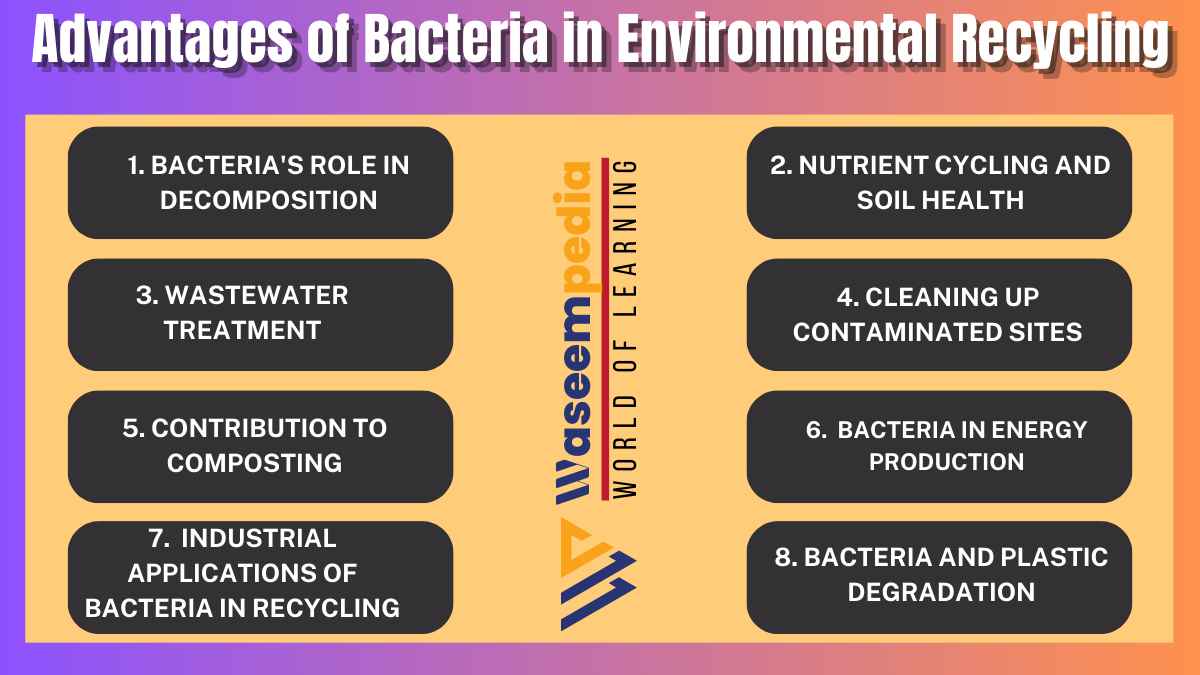Recycling plays a crucial role in promoting environmental sustainability and reducing the impact of waste on our planet. While many people are familiar with recycling in terms of separating plastic, glass, and paper, there is another key player in the process that often goes unnoticed: bacteria.
Bacteria, despite their microscopic size, play a vital role in environmental recycling. In this article, we will explore the advantages of bacteria in environmental recycling and shed light on their significant contributions.
Bacteria play a pivotal role in environmental recycling. From decomposition and nutrient cycling to wastewater treatment, bioremediation, and plastic degradation, bacteria contribute in numerous ways to the recycling processes that keep our environment sustainable.
Their unique abilities make them indispensable in waste management, pollution control, and resource conservation.
Introduction Advantages of Bacteria in Environmental Recycling
Bacteria are single-celled microorganisms that are found abundantly in various environments, including soil, water, and air. These tiny organisms have the remarkable ability to break down complex organic matter into simpler compounds, contributing to the natural recycling processes in the environment. Let’s explore the advantages of bacteria in environmental recycling.
Understanding Bacteria and Environmental Recycling
Environmental recycling involves the breakdown and reuse of organic materials. Bacteria play a crucial role in this process by breaking down complex organic compounds into simpler forms that can be readily used by other organisms. They act as nature’s recyclers, efficiently converting waste into valuable resources.
11 Advantages of Bacteria in Environmental Recycling
11 Advantages of Bacteria in Environmental Recycling are as following.
1. Bacteria’s Role in Decomposition
One of the primary advantages of bacteria in environmental recycling is their ability to decompose organic matter. Bacteria secrete enzymes that break down complex molecules, such as proteins, carbohydrates, and fats, into smaller components. This decomposition process releases nutrients back into the environment, making them available for reuse by plants and other organisms.
2. Nutrient Cycling and Soil Health
Bacteria are essential for nutrient cycling in ecosystems. They break down organic matter, releasing essential nutrients like nitrogen, phosphorus, and potassium into the soil.
These nutrients are then taken up by plants, promoting their growth and contributing to the overall health of the ecosystem. Bacteria also improve soil structure, aeration, and water-holding capacity, making the soil more fertile and resilient.
3. Wastewater Treatment
In wastewater treatment plants, bacteria play a crucial role in breaking down organic pollutants. They convert harmful substances, such as organic chemicals and pathogens, into harmless byproducts through a process called biodegradation.
Bacteria-based treatments systems help remove contaminants from wastewater, making it safe for release back into the environment.
4. Bioremediation: Cleaning up Contaminated Sites
Bacteria possess the unique ability to degrade and detoxify various pollutants, including petroleum hydrocarbons, heavy metals, and pesticides. This process, known as bioremediation, involves the use of bacteria to clean up contaminated sites.
Bacteria break down harmful substances into non-toxic forms, effectively restoring the natural balance of the ecosystem.
5. Contribution to Composting
Composting is an eco-friendly way to recycle organic waste. Bacteria are essential contributors to the composting process. They break down organic materials, such as food scraps, yard waste, and leaves, into nutrient-rich humus.
The compost produced by bacteria can be used as a natural fertilizer, enriching the soil and reducing the need for chemical-based alternatives.
6. Bacteria in Energy Production
Bacteria have shown great potential in the field of renewable energy production. Certain bacteria, such as those found in anaerobic digesters, can convert organic waste into biogas, a valuable source of renewable energy.
This process, known as anaerobic digestion, not only generates clean energy but also helps in waste management by diverting organic waste from landfills.
7. Industrial Applications of Bacteria in Recycling
Bacteria find widespread use in various industrial sectors for recycling purposes. For instance, in the textile industry, bacteria are employed to remove unwanted dyes and chemicals from wastewater, reducing pollution. In the paper industry, bacteria assist in breaking down wood pulp during the recycling process, allowing for the production of recycled paper.
8. Bacteria and Plastic Degradation
Plastic pollution is a significant environmental concern. However, researchers have discovered certain bacteria that have the ability to break down plastic waste. These bacteria produce enzymes capable of degrading plastic polymers, offering a potential solution to the plastic waste crisis.
9. Bacteria’s Role in Oil Spill Cleanup
In the unfortunate event of an oil spill, bacteria play a crucial role in the cleanup process. Some bacteria possess the ability to consume and break down oil, aiding in its biodegradation. By introducing these oil-eating bacteria to affected areas, the natural breakdown of oil can be accelerated, minimizing the long-term ecological impact.
10. Bacteria and Paper Recycling
The paper recycling industry heavily relies on bacteria to remove ink and other contaminants from recycled paper. Bacteria-based processes, such as enzymatic deinking, break down the ink particles, allowing them to be easily removed. This facilitates the production of high-quality recycled paper while reducing the demand for virgin pulp.
11. Bacteria’s Impact on Air Quality
Certain bacteria have the ability to break down harmful gases and pollutants present in the air, contributing to improved air quality. These bacteria convert pollutants like nitrogen oxides and sulfur dioxide into less harmful substances, reducing the impact of air pollution on human health and the environment.

